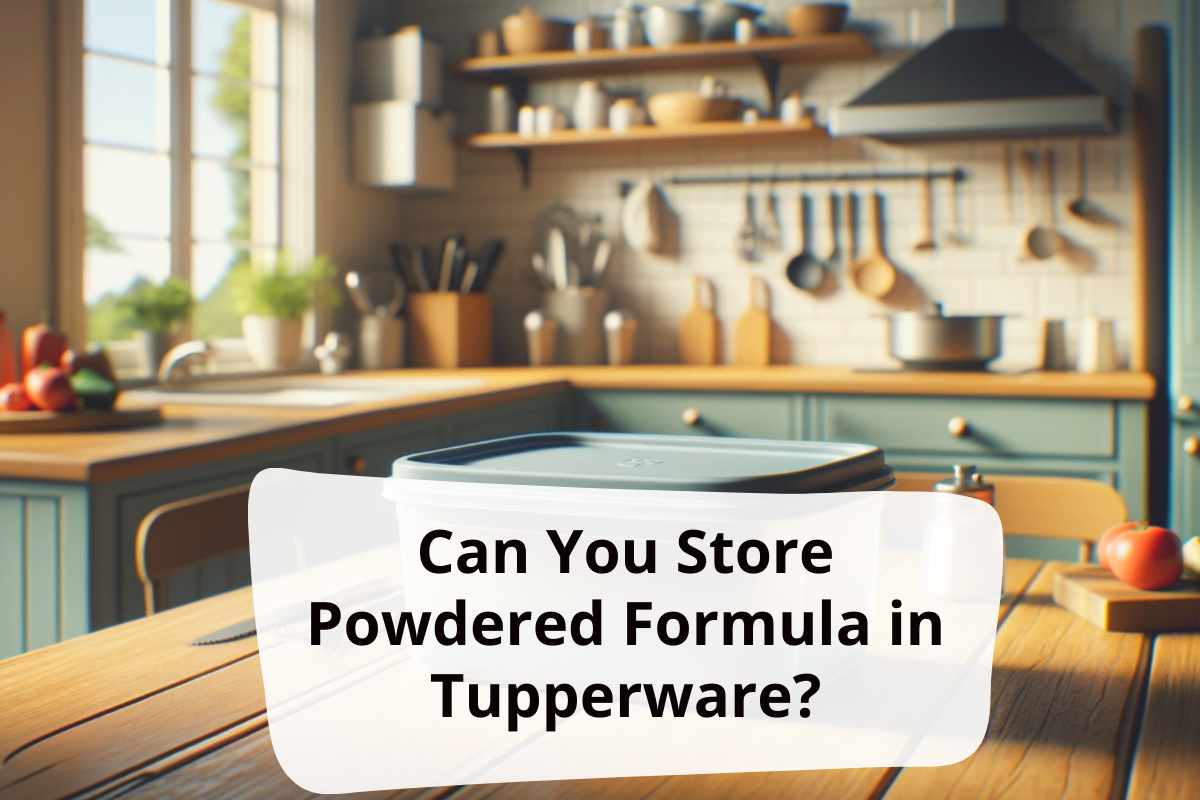If you’re living in a small home or like to keep your baby’s stuff organized, you’re likely asking if you can store powdered formula in Tupperware. We found these nifty containers that come in different shapes and sizes useful for keeping our baby formula neatly stashed knowing it was safe as well!
You can store powdered formulas in Tupperware. They’re eco-friendly, BPA-free, and top-quality containers that keep baby’s formula fresh and germ-free. Not all plastic containers are suitable for storing powdered formula, especially if they’re not made with BPA-free materials.
Key takeaways
- Tupperware containers keep powdered formula hygienic, clean, and dry and they’re easier to store or stack.
- Sterilize Tupperware items before use, ensure the lids are airtight, and that the item is BPA-free.
- Avoid storing powdered formula under humid, damp, or extremely cold conditions.
Can I store powdered formula in a plastic container?
You can store powdered formula in a plastic container as long as it’s bisphenol A (BPA) free. Poor quality plastic products may also contain other harmful chemicals such as phthalates that leach into your baby’s formula, making it harmful when consumed.
Why would you want to store powdered formula in Tupperware?
The tin is damaged
While baby formula tins are generally good quality and sturdy, they can occasionally become damaged. If the lid is cracked or the tin itself has a bad dent or hole, it’s important to store the formula in a sealed container such as Tupperware to keep it hygienic and dry.
Tupperware is easier to store
Tupperware comes in various shapes and sizes, making it easy to pick a container that not only keeps formula safe but makes it easier to stack in your kitchen cupboard. The brand’s modular oval and square sets let you pick the best size for all your storage needs.
Makes it easier to measure
It can become difficult to scoop out the right amount of formula when the tin is nearly empty! When stored in a container that has a wide opening, it’s easier to measure the right amount of powdered formula when next preparing your 5 oz or 8 oz bottles!
How to prepare your Tupperware for storing powdered formula
Use this step-by-step guide to ensure your baby’s formula is hygienic for consumption:
Step1: Ensure the container is BPA-free
When buying Tupperware for storing powdered formula, ensure it’s BPA-free. According to the company’s US website, Tupperware items sold in the USA have been BPA-free since 2010, making them safer than most other plastic containers.
Step 2: Clean and sterilize the container before use
Place the Tupperware container in hot water with a mild detergent for 5 to 10 minutes. You can use Dawn dish soap to wash baby bottles and Tupperware containers. Once washed, leave on a drying rack to air dry. Avoid using a dish cloth to dry the container as you could contaminate it with germs.
Step 3: Keep your hands clean when handling the container
When handling the container and transferring powdered formula from its original tin, make sure your hands are clean and dry. This way, you can prevent contaminating the baby formula with bacteria or other harmful microorganisms.
Step 4: Keep the lid properly closed
The lid must close properly to preserve the quality of the formula. It’s important to keep the brim of the container free of formula powder as this can prevent the lid from sealing tightly. Inspect the lid regularly to ensure there’s no damage.
What features should your Tupperware have when storing powdered formula?
- Airtight lid: Lids need to be sealed tightly to prevent air or moisture from getting in and spoiling the powdered formula. Airtight lids also prevent pests from contaminating the contents.
- No holes or cracks: Do regular inspections of your Tupperware containers to ensure no damage could cause the formula to be ruined while stored.
- Dry inner and lid: Always ensure the inside of the container and the lid are dry before filling with baby formula.
- No dirt or grime: Tupperware containers must be free of dirt and grime and well-sterilized before filling with formula.
- White containers are best: Clear or white plastic recycles better than colored types, making them more eco-friendly.
BPA-free Tupperware products give you peace of mind that your baby is safe. Watch this video about the dangers of BPA.
Where should you never store baby formula?
In humid conditions
If you live in a humid environment, storing powdered formula in tightly sealed containers is doubly important. Store containers in clean and dry places such as the kitchen pantry.
Extreme cold conditions
Once opened, powdered formula should be consumed within 30 days even in extremely cold conditions. According to the Centers for Disease Control and Prevention (CDC), dry infant formula should never be stored in the refrigerator.
Damp places
Powdered formula should never be kept in damp places such as the basement or laundry room even if it hasn’t been opened yet. Moisture spoils baby formula and if consumed by your infant, could result in vomiting, diarrhea, or loss of appetite.
Places where there is a pest infestation
If not properly sealed, pests such as ants and roaches may get inside the container and spoil the baby formula. These pesky creatures are attracted to the sweet flavor so make sure the lids are tightly closed when storing in Tupperware or other plastic containers.
Wrap-up
Tupperware is a wonderful solution for storing powdered formula safely whether you’re at home or out and about. However, make sure the items are BPA- and phthalates-free to preserve the quality of your baby’s formula. Or you may want to consider storing your baby formula in a glass jar.
When baby formula smells bad, check for spoilage and make sure poor-quality containers aren’t the culprit!

